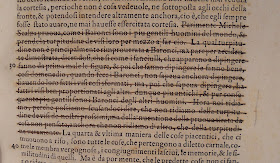 When someone mentions censored books, they usually think of entire texts being suppressed or offending passages expurgated from novels. However, there is a long tradition of censorship that allows the reader access to the text while still explicitly indicating its heretical or unsuitable nature.
When someone mentions censored books, they usually think of entire texts being suppressed or offending passages expurgated from novels. However, there is a long tradition of censorship that allows the reader access to the text while still explicitly indicating its heretical or unsuitable nature.This 1576 edition of Aristotle's Poetica was placed on the Index librorum prohibitorum not because there was a problem with Aristotle, but because Lodovico Castelvetro's neoclassical commentary offended church doctrine. Castelvetro was excommunicated from the church for his alleged protestant sympathies and his writings were subject to intense scrutiny.
 The censorship resulted in the careful crossing out of all heretical statements, while keeping the book, and the text itself intact. One has to wonder how a 16th-century reader would have read this text after the censors had finished their work. Would one read the censored parts, skip over them, or, perhaps, dive deeper into those passages? A truly pious reader might encounter these sections and examine them to understand why they were heretical, and thus mentally rehearse prescribed belief. Could providing access to the text, even while condemning it, actually have helped cement established doctrine in the inquisitive reader's mind?
The censorship resulted in the careful crossing out of all heretical statements, while keeping the book, and the text itself intact. One has to wonder how a 16th-century reader would have read this text after the censors had finished their work. Would one read the censored parts, skip over them, or, perhaps, dive deeper into those passages? A truly pious reader might encounter these sections and examine them to understand why they were heretical, and thus mentally rehearse prescribed belief. Could providing access to the text, even while condemning it, actually have helped cement established doctrine in the inquisitive reader's mind?See for yourself by asking for Rare PN1010.A73P1 1576

